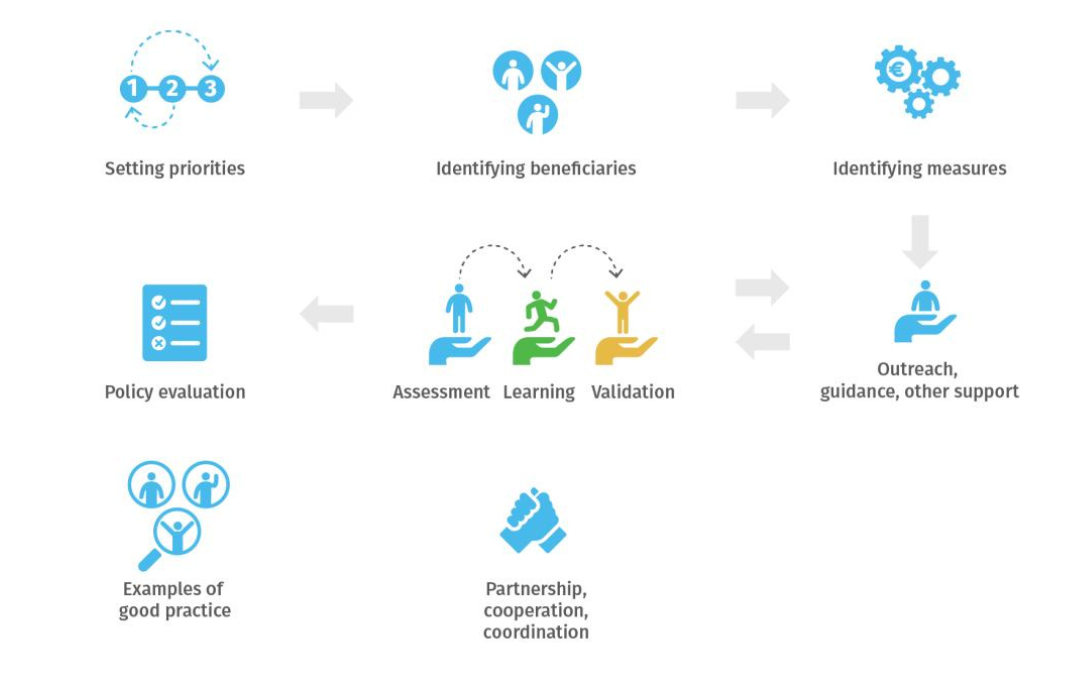When in 2016 the European Commission issued its Recommendation on Upskilling Pathways: New Opportunities for Adults, it envisioned two reports on its implementation. The first one – Implementation Report on Upskilling Pathways (February 2019) was prepared after only two years. The report mentions Slovenia in the group of countries in which the UP implementation is tied to existing national strategies and measures. These are (mostly) implemented through projects co-financed by ESF.
The second reporting period for UP ends this year, and EC is carrying out several activities for this purpose. From 16 December last year to 20 March, a public debate took place. In parallel, EC has conducted interviews with experts working in key UP areas. This opportunity was also given to Tanja Vilič Klenovšek, MSc, of the SIAE who is recognised abroad as an adult education guidance expert.
As a reminder: the UP initiative involves three steps
It consists of assessing existing skills, creating a tailored learning offer and validating and recognising learning outcomes. These steps are accompanied by support measures such as guidance, outreach, educators’ professional development, etc.
Through UP, adults should achieve a minimum level of literacy, numeracy and digital skills and/or acquire a broader set of skills. They should progress towards attaining an upper secondary qualification or equivalent (level 3 or 4 in the EQF depending on national circumstances).
EAEA recently prepared a comprehensive statement justifying in five areas (financing, governance, cooperation, inclusion and addressed skills) what needs to be done to accelerate the UP implementation – or adult learning and education in general (as it seems that the boundary between the two is almost blurred). Perhaps it is crucial that UP addresses mainly adults with low education or low skills, but through the prism of lifelong learning, the latter will sooner or later concern every adult.
We set up the e-portal Upskilling Pathways within the EAAL project
Within the EAAL project, we also paid attention to this issue and created the UP e-portal in 2017.
The purpose of the UP e-portal is:
- To raise the profile of the UP Recommendation.
- To raise the awareness of stakeholders on the link between existing national endeavours and the UP implementation in Slovenia.
- To inform the public about measures in the field of politics and the profession and their implementation.
- To present examples of good practice in UP implementation (in Slovenian) and thus create a collection of qualitative and quantitative outcomes and impacts.
- To inform the widest public about learning opportunities, guidance and other support measures available to them.
Of course, the effectiveness of the portal depends on the wealth of information we publish.
UP Recommendation is one of the key components of the strategic document in adult education, i.e. New EAAL 2021–2030. Therefore, the EC has recently organised a consultation webinar for EAAL national coordinators and representatives of European PES. They wanted to find out how the UP implementation is carried out in our countries, what outcomes we are achieving and what obstacles we are facing.
We told the EC representatives that this initiative is not well known in Slovenia, that more activities to raise awareness are necessary, as well as ensuring that one of the competent ministries takes responsibility for its implementation. At the same time, inter-ministerial coordination is needed, as the issue concerns several departments. We were supported by the representative of Germany, where the challenges are the same, and it is similar in many other countries.
I remember that at the end of 2016, with the publication of the UP Recommendation, the question arose among the EAAL coordinators as to why there were no financial sources for the implementation of this initiative. It was made clear at the time that they are available (e.g. ESF funds, most recently the Recovery and Resilience Facility and E+ projects announced for the UP implementation). So there is plenty of money, but the link between the UP initiative and sources needs to be renewed and intensified!
Zvonka Pangerc Pahernik, MSc (zvonka.pangerc@acs.si), SIAE

